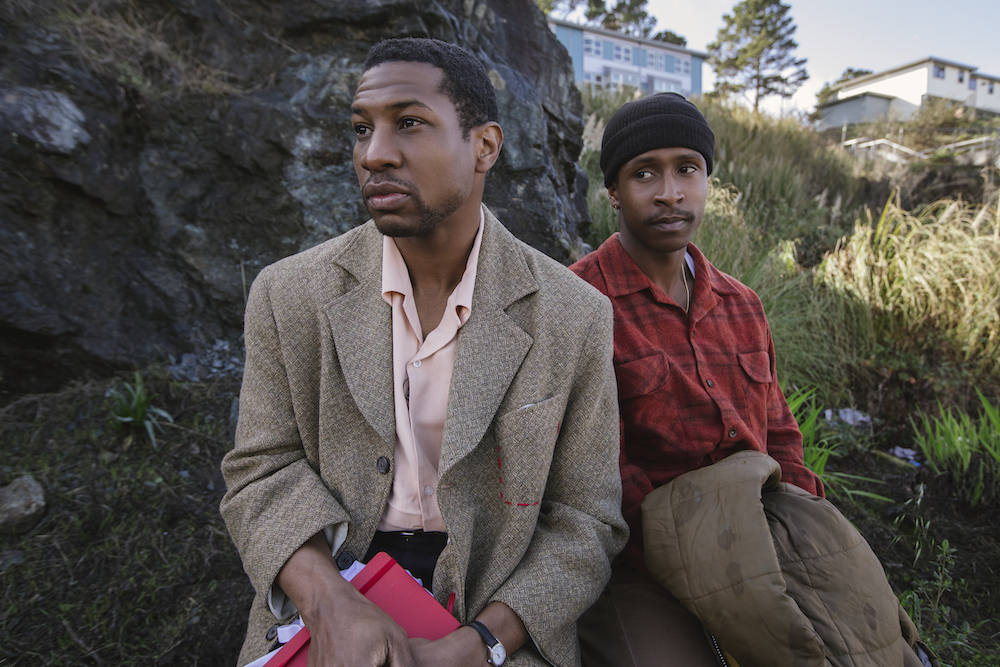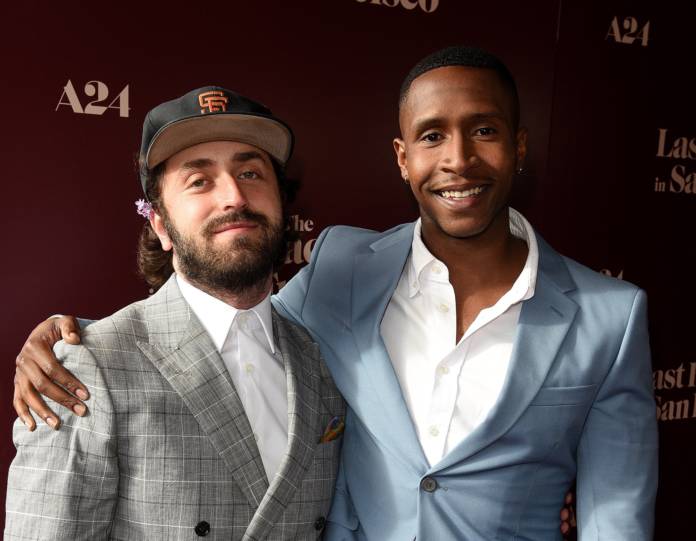Two African American dreamers, Jimmie (first-time actor Jimmie Fails) and Mont (Jonathan Majors) are struggling to survive in the unforgiving reality of the City by the Bay in “The Last Black Man in San Francisco,” out Friday.
While they’re not technically the last two African Americans in SF, in the poignant surrealist film loosely based on Fails’s own life, it can surely feel like it in the heart of The City from where people of color are increasingly exiled, thanks to wave after wave of gentrification.
In the movie, which opens Fri/7, Jimmie grew up in the Fillmore District, in a beautiful Victorian house that his grandfather was said to have built when the so-called “Harlem of the West” still boasted a thriving black community and a vibrant jazz scene. Now, Jimmie is hanging on to a proverbial life raft, living a meager existence amid the Bayview–Hunters Point projects with his aspiring playwright friend Mont and Mont’s grandfather (Danny Glover). He wants to reclaim his childhood home, calling in Mont for reinforcement in the Plan B Entertainment-produced film. [Read critic Dennis Harvey’s review here.]
I spoke to actor Jimmie Fails, 24, and first-time director Joe Talbot, 28, who’ve been buddies since childhood about their longtime friendship—Fails grew up in the Mission and Talbot in Bernal Heights; they met in Precita Park—and how it inspired The Last Black Man in San Francisco.
48 HILLS How did you two meet?
JIMMIE FAILS We were in the same general neighborhood for a long time and we’d see each other around from the time I had moved to that neighborhood at age nine. Once I got settled there and went out and started meeting more people the next year, I saw Joe when I was 10 and then met him when I was 11.
48 HILLS Why did it take so long to meet?
JOE TALBOT So it was the kind of thing where you see him around, and if I was more confident, I’d have said, “Hey, you seem cool, you wanna be friends?” kind of thing. It took a little while, but there was a silent acknowledgment of “I kind of think we would bond,” and then we had one really long heart-to-heart one night.
Help us save local journalism!
Every tax-deductible donation helps us grow to cover the issues that mean the most to our community. Become a 48 Hills Hero and support the only daily progressive news source in the Bay Area.
He came over to my house with a friend of ours and I was there with my girlfriend, and it was a house where there were kids in and out, making music, making movies, and we just ended up talking all night.
48 HILLS I read that after meeting, you’d have epic nights walking around and chatting about your hopes and dreams, your fears and jealousies, and, of course, girls. Tell me more about those early conversations.
JIMMIE FAILS You always have talks with your friends, right? But there’s a difference with Joe because we have a different relationship and are closer in a different way, that we get to a deeper place because we’re so open and vulnerable with each other. This movie couldn’t have been made if not for that.
48 HILLS So what exactly were your hopes, dreams, and fears?
JOE TALBOT I think we were still working out things. It’s interesting to think back to certain things we talked about. We both made music. We made music together, so we’d talk about music and get excited about the same things. Other times, it was specific to stuff we were going through like a specific drama with a girlfriend or we didn’t have a lot of other guy friends that we could even open up to, feeling sad or jealous.
JIMMIE FAILS Outside of each other, our friends are women because those were the only other people we could be vulnerable in that way with.
JOE TALBOT Especially when you’re younger, but we would have friends, too, that’d be around us that would try to tap into a more vulnerable side, but then when they’d be around other kids, you’d see them kind of turn in a way, like Kofi in the movie.
JIMMIE FAILS It’s crazy that word “masculine” because it’s like a mask. It’s like you’re putting on a mask. That’s how I feel about it sometimes. We shouldn’t have to be that way, and that’s what we’re trying to explore in the movie. You don’t have to be that way all the time.
48 HILLS The two of you have such a strong friendship and an interesting backstory. So why didn’t you just make “The Last Black Man in San Francisco,” about your friendship?
JOE TALBOT The honest to G-d truth was that it was never a thought that crossed my mind. I think when we first started talking about it, the earliest iteration was Jimmie in this house because that was the story that I’d known. But then I thought there’s something interesting about putting him with someone who’s different than him.
So half of it is the shit that happened and pulling from that. But the other half is the fun of movies, particularly narratives. You go into your imagination and think about what would be the interesting story? And thinking about this friendship and creating a character, obviously, our friendship is what brought us together to make this movie, so it’s natural to ask how much of the friendship onscreen is us.
But Jonathan is such a brilliant dude, that he really invented a character. He took what was in the script to a whole ‘nother level and they created a bond that I see shades of our vulnerability with each other in. But it’s its own thing and it’s weirdly its own thing in real life, too. They have their own really close connection that they formed.
48 HILLS Were you the least bit jealous?
JOE TALBOT Yes, I was, although Jonathan and I have our own connection, too. So Jimmie was jealous of him, too. [Laughs]

48 HILLS So many young people are trying to get their first movie made. What advice can you give them, from your own experience?
JOE TALBOT I never knew what collaboration meant till this movie. It sounds like a cliche, but it’s true. We shot the concept trailer five years ago and put it online and it became this accidental calling card, where all these people were writing us and saying, “I feel like I’m the last whatever in the Bay,” so we through that built this core team of people that all had complementary skill sets and were all learning together.
And people were wearing many hats, by turn helping with casting, location scouting, doing background and script supervising, as well as writing with us—and that’s one person. But it needed that. I actually want to take that to every production we do—this bigger collaborative nature—because then everyone has more of a bigger ownership of the whole thing. They commit more of themselves to it because they’re not just there in service of something; they’re there helping create the whole film.
Also, we lived in my parents’ house to get this movie made for five years. That speaks to San Francisco. Brad Pitt can be your executive producer, but you’re still living at your parents’ house.
THE LAST BLACK MAN IN SAN FRANCISCO
Opens Fri/7
Various Bay Area theaters
Tickets and more info here.





